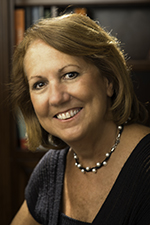 Carol Thomas is a career educator and former high-level urban district administrator who is now working with private schools that participate in Florida's tax credit scholarship, and she tells a remarkable on-the-ground story about Common Core State Standards today in Education Week.
Carol Thomas is a career educator and former high-level urban district administrator who is now working with private schools that participate in Florida's tax credit scholarship, and she tells a remarkable on-the-ground story about Common Core State Standards today in Education Week.
Thomas, who is vice president for student learning at Step Up For Students, which hosts this blog, is working with about 140 private schools in a pilot project focused on a learning compact for low-income scholarship students. The intent is to build meaningful engagement between parents and teachers and, to guide the relationship, she offers an online tool to help both parties mutually track the academic progress of each student. That tool relies on the standards enumerated in Common Core, which is where this plot thickens. These are private schools for whom educational independence is in their DNA, after all. But what she is finding is that these schools are all in for Common Core.
"Our target for the state pilot was to find 100 scholarship schools that would volunteer to participate," she wrote. "We already have more than 140, and my phone is still ringing. These principals aren't calling to lecture me on state sovereignty or intrusive regulation. They are calling because they think the common standards will help them guide the learning plans in their schools."
Thomas relates the impressions of Suzette Dean, principal at Bible Truth Ministries Academy, a small mission-driven school in Tampa that serves mostly African-American students. Dean told her: "Finally, we are all on the same page (with the standards), our teachers know what to teach, and the parents know what their children should be doing in school. Sure, it is a change, but it is real change that is needed if we are going to prepare our students for college and a successful future."
The project has caused Thomas to reflect on the national debate of late, and to suggest that those who see the standards as a federal government plot might want to ask these private-school principals why they would volunteer for Common Core. The answer, apparently, is that these educators think the standards might help students. Go figure.
Florida business leaders put a spotlight Wednesday on the promise and potential pitfalls of Common Core - the tough, new academic standards that are rolling into Florida schools and will help re-shape teaching, learning and testing.
At a wide-ranging, day-long education summit in Orlando, several participants suggested a public awareness campaign to inform parents about the changes – which may be initially painful when they're implemented in the 2014-15 school year - and to rally broad support in a way that has eluded many of the state’s other, recent education reforms.
“These tend to be Tallahassee conversations. But if we don’t do this right, it becomes a Miami conversation or a Jacksonville conversation” and not in a positive way, Marshall Criser III, president of AT&T Florida and chairman of the Florida Council of 100, told redefinED during a break. “We have an opportunity and responsibility to take this back to our communities ... Because if not us, then who?”
“The state should own this initiative,” Education Commissioner Tony Bennett told attendees, reminding them of the marketing effort a decade ago for Just Read, Florida. “It shouldn’t be teachers against people. It shouldn’t be the state against schools, state against districts. This should be a statewide rollout that says this is important to our children and this is important to the future of our state.”
The Council of 100 sponsored the summit with the Florida Chamber Foundation, the National Chamber Foundation and the Institute for a Competitive Workforce. About 100 people attended, including three lawmakers, two superintendents, Board of Education Chairman Gary Chartrand and Florida Education Association President Andy Ford.
Spurred by the National Governors Association and the Council of Chief State School Officers, the Common Core standards in math and language arts have been adopted by 44 states. They’re well-thought-out and well-vetted. They’re benchmarked against international standards. They’re designed to instill a deeper knowledge than state standards do now. In the long term, supporters say, the higher bar will better prepare students for college and careers and an ever-more-competitive world. In the short term, though, ouch: They’re expected to result in a steep drop in test scores – and all the angst that comes with it.
“That’s a pain point,” Criser said. “But people have to understand that’s good,” he continued, because it’s the first step on a better path.
The discussion around Common Core has centered almost exclusively on public schools. But its gravitational pull is expected to be so strong that the impact will be felt at the private schools, too, to varying degrees. (more…)